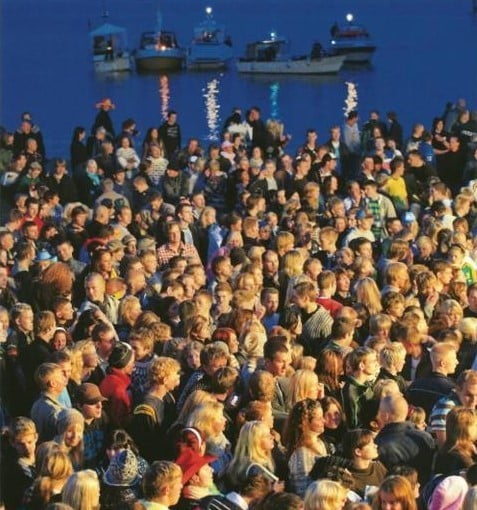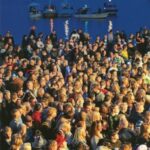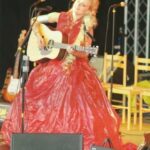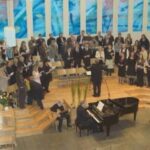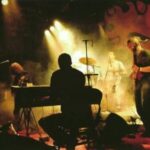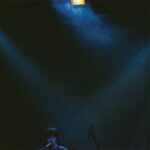Music holds an important position in Faroe society. It has always been so, but the trend in recent years has shown a widening spread in musical genres. More and more young Faroese choose music as a full time occupation. Several of these, perhaps even all, practice or compose in several genres so there is considerable communication between styles.
The ethnic musical form in the Faroes: the singing of hymns, rhymes and in particular the traditional Faroe dance (chain dance with long ballads chanted with it) have been the best known forms of music up through the ages. The Faroe dance arrived in the islands in the Middle Ages, when ballad singing and dancing were the fashion in large sections of Europe. Only in Faroe this tradition has remained unbroken. It still enjoys support among children and young people, especially thanks to the efforts of older dancers and their dance clubs. The dance is now also part of the primary school curriculum.
Eivør Pálsdóttir
Eivør Pálsdóttir (born 21st July 1983 at Gøta in the Faroes) is a Faroe singer and composer, whose voice contains mountain, drama and sweetness.
Many call her “the Faroe Bjork”, and like Bjork she is loved, not only in Faroe but also in Iceland. She is no doubt among the great talents in the Nordic Countries. Her roots go back to the Faroe ballads, but she commands a broad spectrum from jazz and folk via ethno-pop to classical and Christian music (Kingo’s Psalms). Like the dramatic light in Faroe her soprano voice is at one and the same time light and fragile but also full of juice and natural force. She is not afraid of shrieking when standing bare-foot on stage. After her second solo album “Krákan” she was nominated for the “Iceland Music Prize” and was awarded the prize as best singer and best artist in 2003. Kristian Blak’s opera “Firra” appeared in 2004 with Eivør as the soloist. She performs here with the Faroe Symphony Orchestra. In 2004 Eivør launched “eivør” with the Canadian singer/songwriter Bill Bourne. In 2005 “Trøllabundin” (Spellbound) she performed with the Danish Radio Big Band. In 2006 Eivør won two prizes at the Danish Music Awards Folk – as best vocalist and best folk album.
Ethnic Inspiration
In present day society the Faroe ethnic music is often an integrated part of modern musical forms rock, world and folk. A good example in a rock context is the repertoire of the group Týr, who mix existing ancient ballads with their own compositions, which in terms of melody are derived from the tonality of the Faroe ethnic music. Other groups such as Harkaliðið, Enekk and Yggdrasil also employ this material, but in a folk or world musical context.
One must, however, note that rock and pop groups write music in an international language. This genre has the most performers in the Faroes — several hundred musicians. They are also represented in most of the CDs released — over 20 per year. The groups play funk, death metal, rock, mainstream, techno etc.
Prize Winning Classical Music Classical compositions or new score music have a brief history. In fact only 25 years or so. On the other hand this form of contemporary music now plays an important part in the musical life, and several works by Faroe composers are performed every year at arrangements and festivals in the islands and abroad. This development may be said to have culminated with the composer Sunnleif Rasmussen receiving the Nordic Council of Ministers’ Music Award.
The number of performing classical musicians is also growing. The ensemble Aldubáran, which usually consists of 8 musicians, can now on special occasions be extended to sinfonietta, and more young musicians than before take part in concerts with Føroya Symfoniorkestur. There are music schools around the Faroes, and now the pupils often choose to continue at conservatories abroad.
Choral singing enjoys much popularity all over. There are many active choirs that both perform with a traditional Faroese repertoire and new choral scores. At regular intervals major classical choral pieces are performed. Most of the choral work is done on a voluntary basis, but also in this genre singers have been assembled in special choirs which can take upon them artistically demanding performances.
International Environment
Jazz and blues have been played in Faroe since the music came to Europe in the early 20th century. An upturn happened in the mid- 70s with the founding of Flavnar Jazzfelag (Tórshavn Jazz Club). The generation who played their first concerts in the club now make up an experienced hard core in the jazz environment, while the interest in jazz is growing among the youngest musicians. There is also on-going musical co-operation with musicians from other countries, which has also played a part in setting a high musical and technical standard. Jazz shares this feature with classical and folk music, where the folk music groups and ballad singers have benefited from the international environment in the Jazz Club and widened their repertoire while getting inspiration from abroad.
Tourists at Concerts
In a country with fewer than 50.000 inhabitants it may be difficult to find audiences for many concerts, especially if the music is actual concert music. For musical groups based in Faroe there are two target audiences to aim at to be able to play an original repertoire several times. About 50.000 visitors come to Faroe from abroad every year. They get here mostly in summer so the arrangements at this time are often exciting for both musicians and audiences, who can hear Faroe music in the country where it originates: Which is at rock concerts, jazz cafés, Faroe dances, folk singing, choral concerts, concerts in grottos and other natural concert halls, classical concerts etc.
More Touring
The greatest challenge may be when touring abroad. It has been possible to experience Faroe dancing and choral singing outside the islands for many years. Lately more genres have been taken on tour, the folk musicians of Spælimenninir being the most peripatetic in past years. Jazz music and jazz-world music have traveled widely. The two most active soloists on the international stage at the present time are the singer/songwriter Teitur and the multi-style talent Eivør, who both enjoy growing career opportunities these years.
Maybe it has been difficult to arrange tours with rock groups. At least they have only recently started to have long tours abroad. But just now it looks promising. In 2006 the following groups have been on stage in Europe and the USA: Týr, 200, Dejá Vu, Braquet, Makrel, Sic and Side Effect.

